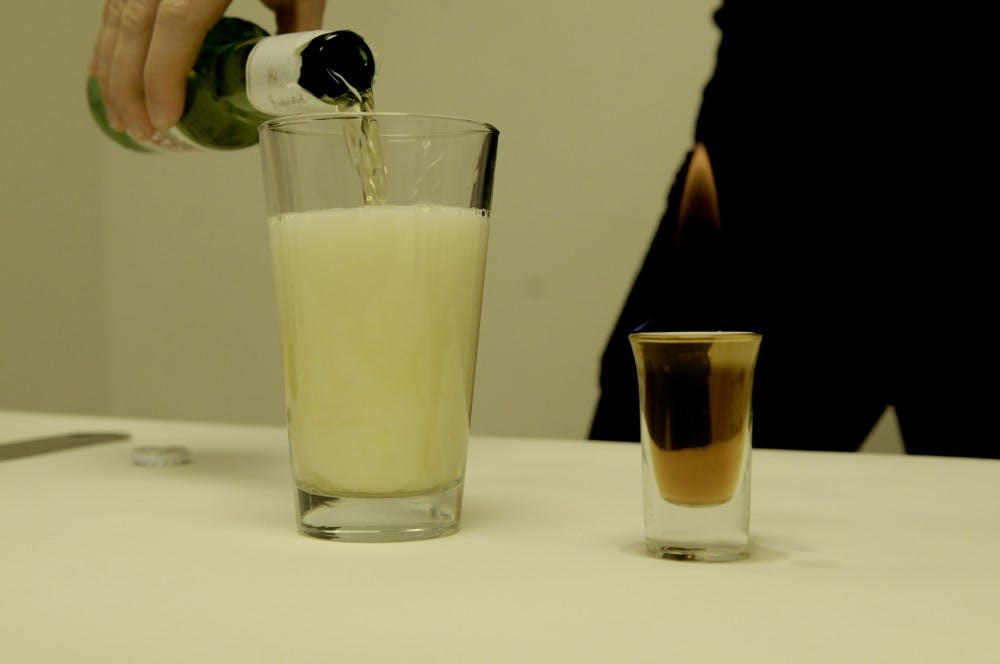
Penn Student Agencies Bartending demonstrates how to make different popular drinks, such as the Flaming Dr. Pepper.
Credit: Freda Zhao , Freda ZhaoThe drink is on fire. Coolly, College junior Jared Fenton pinches the sides of the shot glass and raises it into the air. Then he drops it into a tall glass of Stella beer, a froth of white foam swallowing the flames whole.
The drink Fenton just made was a Flaming Dr. Pepper Shot — one of the many recipes in his repertoire as a student bartender for Penn Student Agencies Bartending.
PSA Bartending is a group of 14 undergraduates who professionally bartend for events on Penn’s campus and beyond. The group started eight years ago, and it is today a fully fledged organization that provides services for everything from weddings to bar mitzvahs to History Department parties.
“Whatever event you can think of, we have bartenders who are certified to bartend [the] event,” said Fenton, who also serves as bartending manager of PSA.
While PSA Bartending may be a small group, a huge interest in bartending is growing among students on campus. For this spring’s Bartending 101 preceptorial, hosted by PSA Bartending, there were around 500 applications for some eight spots, according to Engineering freshman Benjamin Blumenstein, the preceptorial’s organizer.
‘It’s just a lot of fun,” Blumenstein said. “They teach you how to make pretty much anything — how to free pour, how to pour with jiggers, shots, layered shots, Long Islands, different mixed drinks. Also, it’s a pretty expensive standalone course, [but] with the preceptorial, it’s free.”
Becoming a bartender for Penn requires only a few steps. You have to be at least 18 years old, take a bartending course from PSA or a similar institution and pass a test to obtain your official bartending certification.
Student bartenders get paid $20 an hour, and each event, known as a “gig,” usually lasts for two to four hours. Sometimes, clients will also give generous tips. Fenton once received a $100 tip for an event that totaled up to a $200 bill.
The agency fields around two gigs each week. Event descriptions are sent out through a student bartender listserv and claimed by whoever is free to work those times on a first-come, first-served basis.
“You can work regularly, but not crazy regularly,” Fenton said. “We definitely aren’t requiring you to work the day before you have a final.”
For students with busy schedules like College sophomore and Daily Pennsylvanian staff photographer Arabella Uhry, bartending is an ideal way to earn some extra cash. Uhry works another job on campus and is part of the varsity fencing team, and she has been a bartender at Penn Student Agencies since her freshman year.
“It’s not a stable income, but it’s totally worth it,” Uhry said. “Honestly, it’s the best job on campus. Even though we don’t work often, you’re paid so well.”
Bartenders are paid not only to pour shots, but also to provide social, friendly service to customers. Fenton cites people skills as an essential quantity student bartenders must have. When too many patrons are crowding the bar or a belligerent customer demands yet another round, bartenders must stay amiable but keep the situation under control.
“When you’re a bartender, it’s your job to keep everyone happy no matter what happens,” Fenton said. “It’s really, really important that you’re able to hold a conversation [and] be polite. You want to keep on engaging people.”
Bartenders are also required to have a firm knowledge of safety standards. A program known as Training for Intervention Procedures ensures bartenders know how to ID clients, serve correct portions of alcohol, discern when someone is too drunk to be served and know how to deal with a host of other tricky situations.
“If they go crazy on you, you learn in safety training different techniques you can use,” Fenton said. “One common technique is you put it on you. You go, ‘Listen, I would serve you if I could, [but] I can’t legally.’”
Overall, however, bartending is a relatively conflict-free job that Uhry calls “really fun and social.” Fenton said he loves talking to people who come hang out at the bar, while Uhry agreed that bartending helped her develop communication skills and deal with a wide range of situations.
“You have people asking you to make things you don’t have the ingredients for, at the same time you have a group of people asking you to dance with them, at the same time you have another one of the staff who’s supposed to be working showing you the marijuana plant he’s growing in his house on his iPhone, and you have to serve drinks to everyone,” Fenton said, laughing. “It’s just funny. And you do it.”
The Daily Pennsylvanian is an independent, student-run newspaper. Please consider making a donation to support the coverage that shapes the University. Your generosity ensures a future of strong journalism at Penn.
DonatePlease note All comments are eligible for publication in The Daily Pennsylvanian.








